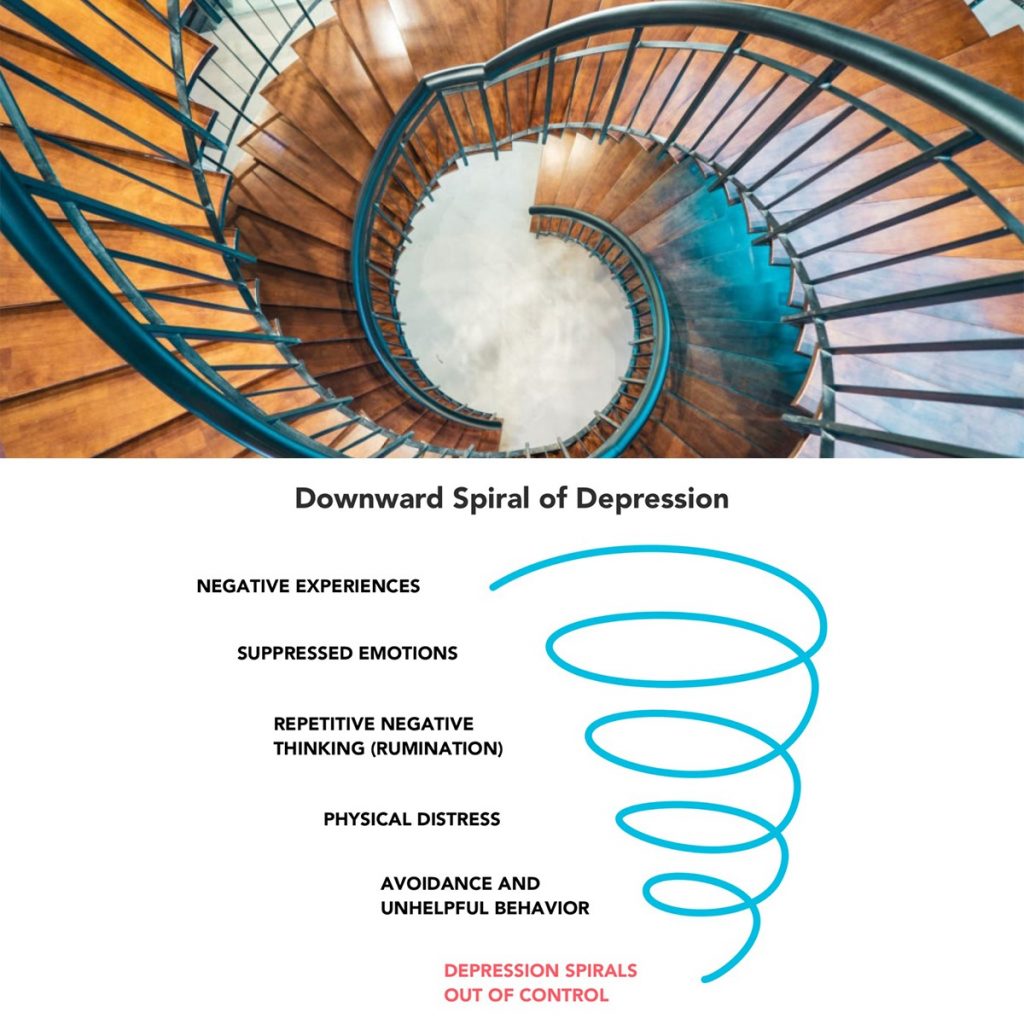Edition: September 6th, 2021
Curated by the Knowledge Team of ICS Career GPS

- Excerpts from article by Dilshad Edibam Khurana, published on mpowerminds.com
- Excerpts from article published on mindmypeelings.com
A downward spiral is defined as a situation where a series of negative thoughts, emotions and actions continuously feed back into themselves, causing the situation to become progressively worse.
Why does this happen?
Understanding Downward Spiral
Our mental wellness is constantly fluctuating. There is no such thing as always being mentally well. We will go through ups and downs throughout our lives. It is important to recognise that one bad day doesn’t mean you are falling into a downward spiral. Take a day off and talk to yourself to see how you can make the situation better.
Downward spirals are often provoked by jumping to the worst-case conclusion.
E.g.: You make a beeline from one critical e-mail by your boss right to “I’m going to be fired.” Or a friend’s failure to take your call as a sure sign she doesn’t like you anymore.
Reversing the Spiral
If you often find yourself falling down the spiral of negative thoughts, here are some simple steps that you can take to reverse this:
1. Be Aware
Just being aware that this is a downward spiral and that you are in it, can help you arrest the fall to some extent. Don’t label it as something else to justify your fretful state.
2. Find the Facts
When you begin to spiral, negative thoughts are usually at its core. These automatic negative thoughts distort your perception of reality. Stop to focus on what is causing these negative emotions. This will help you separate facts from the worst case scenarios that might be building in your head.
3. Write it Down
Writing out what you are feeling enables you to process your thoughts and emotions in a healthy way. Having an outlet for that mental clutter will bring clarity and focus to your mind. When you put your thoughts to paper, you will often see that the challenge is not as big as you make it out to be. It also helps seeing it from a ‘third-party’ perspective.
4. Shift your Attention
Start by focusing on one positive thing every day – like the hug of a family member or that nice song you heard. Now try to bring that to the forefront rather than the negative emotion troubling you. Indulge in self-care activities that are fun such as your hobbies or exercise. Pick engaging activities that promote physical, mental and social wellness.
5. Be in the Present
Practise breathing and mindfulness to accept your challenges and be in the present rather than worrying about the future or regretting events from your past. Staying in the moment helps a lot in steering clear of unproductive and negative thoughts.
6. Manage your Expectations
Ask yourself what part of the problem can you realistically do something about and what is outside of your control. Once you pin point the things that are out of your control, it’s easier to stop worrying about them.
7. Keep an Emergency Relief Kit
An emergency relief kit is a collection of physical objects, reminders or activities to help you remain calm and alleviate some symptoms. Keep a few positive things handy like essential oils, a favourite t-shirt, a happy song, a journal, a snack that will instantly make you feel better, etc.
8. Show Self-Compassion
Remind yourself that not everything can be perfect and negative emotions are completely natural. It’s okay to not be okay sometimes. Positive self-talk can help reduce stress, boost confidence and resilience, and improve your overall mental wellbeing.
9. Increase your Happy Hormones
Dopamine, Oxytocin, Serotonin and Endorphins (D.O.S.E) are happiness hormones. Each of these has a job to do and contributes towards your mental wellbeing. There are activities you can do that naturally increase these hormones. This can be helpful when you feel like you’re spiraling downward. Activities like meditation, getting a massage, playing with a pet, socialising with good friends, etc., can increase your happiness hormones.
10. Exercise
Get out, get moving and exercise. This helps release happy chemicals and is known to reduce stress and anxiety. Also, reduce your use of sugar, caffeine and alcohol.
11. Reach out for Help
Have a list of people you can contact. This should include close friends and family. The friends and family you choose should be people who give you a feeling of trust and safety. This will make you feel comfortable and more willing to share what you are going through. Do not hesitate to seek professional help to overcome your overwhelming feelings.
Tip: Don’t wait for a downward spiral to occur before you start taking action. Be proactive and practise self-care as part of your daily routine. This will reduce the likelihood of a downward spiral.
…
(Disclaimer: The opinions expressed in the article mentioned above are those of the author(s). They do not purport to reflect the opinions or views of ICS Career GPS or its staff.)



